
You are currently browsing the blog archives
for September, 2009.
Archives
Blogroll
|
Archive for September, 2009
Thursday, September 24th, 2009
Evidence that I am at the center of the universe continues to mount. Take that guy I wrote about last week who says my blog is too self-serving. First, local TV station KSAT does a news story about my comic book debut. Then the local newspaper wants my humble opinion on the new Dan Brown novel. And now… And now, my friends, I am not only a person, I am a place. Someday I hope to be a thing, and thereby achieve total nounhood.
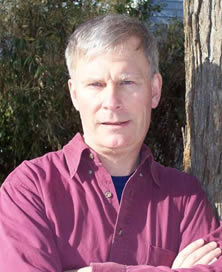 James Grady When I attended the Festival Blues in Piacenza, Italy this spring, among the many extra cool people I met was James Grady, uber novelist and journalist, author of many fine books, including the iconic Six Days of the Condor, source material for the temporally-tightened film of a similar name. He’s also just a great guy to hang out with in Italy. If you head over to Politics Daily, you’ll find Grady’s on-going serialized novella, What’s Going On, which I am very much digging. It’s a gritty, urban, political drama – truly absorbing stuff. What’s even better, much of the drama centers around a fictional DC neighborhood called Liss Gardens, where nothing good is going on. I think one of the lessons of the story is that you don’t want to dwell in the Liss Gardens, so, um, thanks for that Jim. Anyhow, Grady’s stuff is always great, so don’t miss out on the chance to stay up to date with an on-going fictional event which all your friends will be talking about. If all your friends are cool.
 I just wanted to post this because it's the coolest poltical sign ever.
Posted in Uncategorized | 3 Comments »
Tuesday, September 22nd, 2009
I haven’t been blogging as frequently lately because I’ve been busy writing, so get off my back. Also, like the rest of you, I was sure that Amazon would have sent me a free Kindle by now, and I wear the burden of disappointment upon a troubled brow.
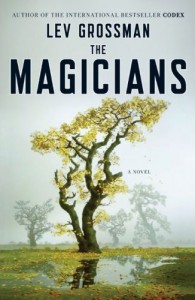 On the plus side, however, I did read another good book. It’s not often I read two books I like so close together. Go figure. This time it’s The Magicians by Lev Grossman. I liked Grossman’s previous book, The Codex, which featured a medievalist I’m 40% sure is based on someone I know. Or maybe there are only so many varieties of medievalists. Actually, the more I think about it, the more likely that explanation seems. On the plus side, however, I did read another good book. It’s not often I read two books I like so close together. Go figure. This time it’s The Magicians by Lev Grossman. I liked Grossman’s previous book, The Codex, which featured a medievalist I’m 40% sure is based on someone I know. Or maybe there are only so many varieties of medievalists. Actually, the more I think about it, the more likely that explanation seems.
The Magicians is one of those novels that tries to translate the Harry Potter experience to adult sensibilities, and it is largely successful in doing so. The main character, Quentin Coldwater, a depressive and over-achieving Brooklyn high school student, is waylaid from his efforts to get into Princeton by an offer to attend Brakebills Academy, the only American higher institution dedicated to the study of magic.
Like the Harry Potter novels, The Magicians posits a shadow world of magic that exists parallel to our mundane existence, all but invisible to ordinary people. Unlike J. K. Rowling, Grossman suggests that the ability to do magic isn’t some vague genetic predisposition, but the effect of real world abilities — intelligence, will and to a certain extent, dexterity. Grossman also infuses his story with sex, swearing, heavy drinking, and most importantly, disillusionment. Quentin is perpetually haunted by the specter of the staggering disappointment of life.
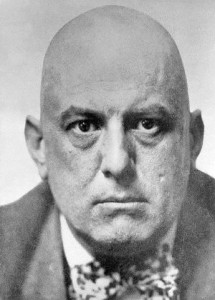 Aleister Crowley is one of the many people with whom this book is uninerested. Rather than recount the plot, which I never like to do, I’ll talk a little bit about what I liked and disliked about the book. On the negative side, this is one of those novels that takes place over a fairly significant number of years, and I tend not to like that. Personal preference here, but I think this style of story-telling tends to make the narrative more impersonal and distant, and that is often the case here. Quentin is a remote character to begin with, and the narrative strategy makes him even harder to warm to. Some of the secondary characters are wonderfully drawn, but others, despite their important presence throughout much of the book, remain vague and uninteresting. At its worst, this is a novel that keeps the reader at arm’s length.
At its best, however, the novel is remarkable. Grossman is a great writer, and his efforts to treat magic as though it were a real thing are successful and fascinating. Magic here appears to be a complex and rational system, even if the magicians themselves don’t understand it, and its effect on the human psyche is always up front and believable. Throughout much of the novel, Quentin’s experiences are haunted by his memory of reading a series of Narnia like novels set in the mythical world of “Fillory,” and those books comes back in the last section of The Magicians in a big and effective way. There were several times when I was reading this book that I found it frustratingly slow or too focused on trivial details, not enough on character. Yet, when it was over, it stuck with me far more than most things I read. There are tons of books I’ve loved reading that I can barely recall now, but I suspect I’ll still be thinking about The Magicians years from now, especially if Grossman does not write a sequel – which he ought not to do. Trust me, Lev.
Posted in Uncategorized | 2 Comments »
Tuesday, September 15th, 2009
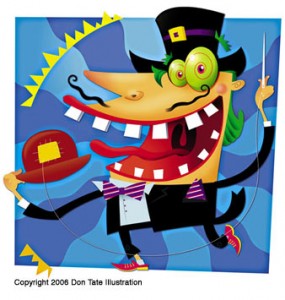 Our in-house artist's conception of the man who emaled me. Don’t get me wrong. Here at davidliss.com, we loves us the internet. If it weren’t for the internet, I’m not sure this web page would have a home. But there is something about communication on the internet that entices some people to forget to keep their inner jerk on a leash. Take, for instance, this email I received the other day from a guy who opens his communication to me, a total stranger, with: “I was disappointed in your website. Too cutesy, too self-serving, insufficiently informative.” Homeboy goes on to tell me that while he hates my blog, he loves my “prose.” By this he means my novels, I think, but it’s hard to be sure since my blog is also written almost entirely in prose – so long as you don’t count that brief and unsuccessful flirtation with heroic couplets, which we all agreed was best forgotten. Finally, Mr. Personality ends with the suggestion that I read his book, but honestly – what are the chances now that he’s insulted me? I was going to tell you his name so I could discourage you from buying his book, but the legal department here has advised me against it, and you were never going to read his book anyhow, so no worries.
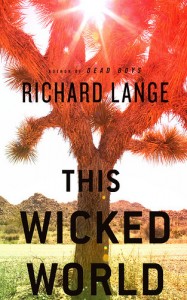 A book you ought to read, however, is Richard Lange’s This Wicked World. In theory, I love crime novels, but I don’t enjoy them anywhere near as often as I like because crime novels are way too often too much crime, not enough novel. In other words, like with most genre fiction, writers often forget what readers dig about fiction in the first place – the chance to read about well-drawn, compelling characters. Lange knows exactly what makes crime fiction work in this story of an ex-con trying to make good in seedy LA. Needless to say, our protagonist gets caught up in some bad business, and ends up doing some rotten things for good reasons, and mixing with a wide array of vivid, engaging, and often disgusting secondary characters. The template is a familiar one in many ways, but that’s true of most novels. The heart of the matter lies in the execution, and This Wicked World is executed brilliantly – reminiscent of Pelecanos at his absolute best. This gets our strongest recommendation. A book you ought to read, however, is Richard Lange’s This Wicked World. In theory, I love crime novels, but I don’t enjoy them anywhere near as often as I like because crime novels are way too often too much crime, not enough novel. In other words, like with most genre fiction, writers often forget what readers dig about fiction in the first place – the chance to read about well-drawn, compelling characters. Lange knows exactly what makes crime fiction work in this story of an ex-con trying to make good in seedy LA. Needless to say, our protagonist gets caught up in some bad business, and ends up doing some rotten things for good reasons, and mixing with a wide array of vivid, engaging, and often disgusting secondary characters. The template is a familiar one in many ways, but that’s true of most novels. The heart of the matter lies in the execution, and This Wicked World is executed brilliantly – reminiscent of Pelecanos at his absolute best. This gets our strongest recommendation.
And, finally, there’s the insane news that Creation, the biopic about Charles Darwin can’t find a distributor in the US because everyone is afraid of crazy religious wackos going all religious wacko on them. This movie, after all, tells the story of a guy who popularized a theory that was being widely developed elsewhere — a theory pretty much everyone who lives in the modern world now knows to be scientific fact. The fact that virtually every biopic ever made sucks seems to be beside the point.
Posted in Uncategorized | Comments Off on
Friday, September 11th, 2009
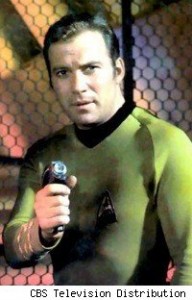 Set phasers to stun -- with knowledge! Today I travels to the wilds of Houston, but not just so I can quench my insatiable thirst for oil. I arrive today so I can be all bright-eyed and bushy-tailed for the start of the all-day seminar I am teaching tomorrow for the Houston Writers Guild. People have paid good money so I can tell them how to write a novel, but I’m going to pass it all along to you, the loyal reader, for free. That’s how much I love you. Admittedly, some of these points require a little elaboration, so I may put the drive to good use by trying to figure out what I was thinking when I wrote out this agenda. Rest assured, however, that anyone who attends this seminar will depart with novelistic superpowers.
The agenda of power!
Part 1: Unlocking your inner power animal, and then locking it back up again
- The single most important thing you will ever hear about crafting fiction.
- What gives fiction energy?
- Debunking the myths; or, self-aggrandizing garbage you may have heard from other writers, that I will now tell you to ignore.
- The magic that is the three-act structure.
- The core of the story. How to begin.
- The secret they don’t want you to know – despite my having no idea who “they” are or why “they” would try to keep this from you.
Part 1 (part 2): My Life in the Bush of Ghosts
- Should you outline or not? And how I could possibly know the answer to that question.
- No, you can’t tell me your idea for my next book. And why.
- Using research in your fiction.
- Samuel Johnson on Milton’s “Paradise Lost.” Seriously.
- Voice, tone, style: the things no one ever talks about, even though they should.
- Writing genre fiction.
Posted in Uncategorized | 1 Comment »
Wednesday, September 9th, 2009
The blogger’s best friend, of course, is the guest blogger. With the help of the guest blogger, the blogger is able to bring you, the reader, fantastic and new content without going to the trouble of thinking of it himself. Convenient, no?
Our inaugural guest blogger is my swell pal Matthew Pearl. Even though, Matthew requires no introduction, I will provide one by cutting and pasting from his web page:
Matthew Pearl is the author of the novels The Dante Club, The Poe Shadow and his newest work, The Last Dickens. His books have been New York Times bestsellers and international bestsellers translated into more than 30 languages. His nonfiction writing has appeared in the New York Times, the Wall Street Journal, the Boston Globe, and Slate.com. He has been heard on shows including NPR’s “All Things Considered” and “Weekend Edition Sunday,” and his books have been featured on Good Morning America and CBS Sunday Morning. Prior to writing novels, Matthew Pearl worked as a freelance cosmonaut.
Please make him feel at home by reading and commenting on his post. I, in the meantime, will make use of all this free time and catch up on some off track betting.
What is historical fiction?
by Matthew Pearl
 Do you know? I write historical fiction and am not always sure I do.
There are a few definitions I’ve come across more often than others.
One definition is that historical fiction is a work set before the author’s lifetime. If I wrote a novel about Al Capone in 1930, I would be writing historical fiction. So far, so good. But under this definition, the category of the novel changes depending on the author. If my grandmother wrote a novel about Al Capone, I guess, it would not be historical fiction.
I’ve noticed that the oldest person in the world seems to be routinely between 110 and 116 years old. Taking the latter age, crossing it with today’s date, it means that a novel could be written now (by that 116 year old) taking place in 1893 and not be historical fiction.
To determine what qualifies under this definition, readers would be expected to know the age of an author when he or she first finished the book. That’s somewhat impractical. Do people always tell the truth about their age? Poe lied about his age. And what if a book is published anonymously or under a pen name? What if a novel is published posthumously? What if an author is an extreme recluse, like Thomas Pynchon?
Does it matter where the reader fits in as far as the lifetime metric goes? If the world’s oldest person reads a novel set twenty five years ago written by a twenty year old novelist, does the definition evolve?
Let us look at another of the popular definitions. This one defines historical fiction as a work set at least fifty years before it is written. This replaces the importance of who is writing with when he or she is writing. Does fifty years make sense to you as the right amount of time? Why not twenty years, one hundred years, or one day in the past? How do we decide where to draw this line?
 Set the Wayback Machine for 1857! Even if fifty years does click with us, there are many points of confusion for this definition, too. First, it puts the burden on a reader interested in the definition to know when the novel was written. This can be tricky, even trickier than determining the age of an author. Perhaps the copyright page says 2009, for instance, but we should remember it is not unusual for a writer to finish a novel at a certain date, but publish it only years later or even posthumously.
What if a novel set in 1959 is started by an 18 year old author in 1985, finished in 1999 by a ghost writer who is 112, and published in 2010 after both authors have died?
Some new high school math problems!
There are other more complicated criteria to try to judge the title question of this post. Must historical fiction display a certain amount of fidelity to history to qualify? If so, how much? A book might be set three hundred years ago, but be injected with large quantities of fantasy or supernatural elements. Would that be historical fiction? Historical romance? Alternate history? Fantasy? All of the above? What if a novel is divided into chapters set in the present day and chapters set many years ago, like my friend Katherine Howe‘s terrific debut The Physick Book of Deliverance Dane?
ADDED: I’ve found it interesting at times people have said to me that they really like historical fiction books like mine and The Da Vinci Code. Interesting because The Da Vinci Code is set entirely in the present! But it and its characters are engaged in history, and certainly that would appeal to self-identified historical fiction readers. In that category, my friend Daniel Levin‘s The Last Ember, an exciting thriller set in the present with archeology characters tackling the subject of the past–in a way the characters themselves are engaged in historical fiction.
Those who follow my posts might notice I don’t really like categories or genres for books. My books have been filed in various categories by bookstores or media, including historical fiction, mystery and literary fiction. I don’t mind my books being categorized by other people or entities, whether readers, journals, libraries or bookstores. However, the categories do nothing for me as a writer and I prefer to think of each book as a story, period, without requiring some other possibly restrictive label.
Obviously, if bookstores had no categories, they would be far too difficult to navigate. Some methods of organization might prove more challenging for browsers than others. There is one bookstore outside of Boston called New England Mobile Book Fair where the books are categorized by publisher! As someone who is nostalgic for a time when publishers had more distinctive identities, part of me likes that idea very much.
You know my qualms about saying I’m a writer, but I’m very content to say The Dante Club, The Poe Shadow, and The Last Dickens are historical fiction.
If an author chooses to position a book as historical fiction, I accept that. I like seeing a book through the lens of its own ambitions, even if it yields cloudier distinctions among books.
I’ll do another post about whether there are “ethics” in historical fiction.
In the meantime, what do you think of the definitions of historical fiction? Do you have a better one? How important are categories or labels to you when purchasing, borrowing, reading or writing a book?
Posted in Uncategorized | 4 Comments »
Monday, September 7th, 2009
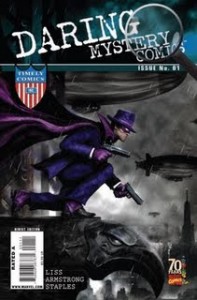 Still on sale, by the way. Just saying. There are a couple of New York Times articles I wanted to blog about last week, but I was too busy promoting my comic book debut, Daring Mystery Comics 70th Anniversary Special (featuring the Phantom Reporter). By the way, here’s a totally awesome, full-length review of the issue. I thought this piece was very thoughtful, and the author really got what I was trying to do, which I appreciate.
Okay, so first of all, there’s Virginia Heffernan’s piece on the future of Facebook. I met Virginia Heffernan several times back when I lived in New York, and she seems like a perfectly nice person, but frankly this article is the sort of New York Times self-absorbed fluffery that drives me crazy. The point of the article: the number of people who are using Facebook may be increasing, but really that’s deceptive because people the author knows, and who clearly matter more than just regular old people, are using it less. To prove the point, Heffernan interviews a bunch of people whose main qualification for being interviewed seems to be that they are her friends. They provide their fascinating reasons for using Facebook less or not at all. Don’t get me wrong. Of all the major American newspapers in the right-wing media establishment, the New York Times is still the least offensive, but this kind of navel-gazing tends to make me seriously think about canceling my subscription.
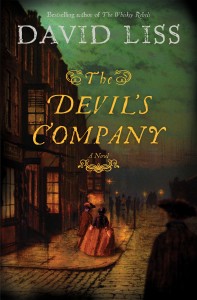 It's better than Moby Dick. Less obnoxiously, the Times also ran a piece on the future of reading in the classroom. More and more, middle and high school English classes are allowing students to choose their own reading material. Personally, I think this is a great idea, especially in middle school, where the canonical selections, let’s face it, are fairly crappy. No one is ever happy to read The Pearl, are they? Why not instill a love of reading and narrative by encouraging kids to find books they like? For high school, I do think some kind of structured reading is important for a well-rounded education, but I don’t see anything wrong with supplementing the canon with books the students choose for themselves. Too many students, who don’t grow up in reading households, have little notion that reading can be fun. Why not show them?
There are, of course, some detractors. From the article:
“What child is going to pick up ‘Moby-Dick’?” said Diane Ravitch, a professor of education at New York University who was assistant education secretary under President George H. W. Bush. “Kids will pick things that are trendy and popular. But that’s what you should do in your free time.”
First of all, if you think high school students ought to read Moby Dick, then you’ve obviously never read it yourself, and you are a big phony liar who pretends to have read books you haven’t. Secondly, yes, students ought to be reading for pleasure on their own time, but in case you haven’t noticed, they’re not. It seems to be a pretty good idea to find ways to encourage them to do just that instead of sticking your head in the ground and saying people ought to be something other than they are, you moron. But that’s just me.
Posted in Uncategorized | 9 Comments »
Friday, September 4th, 2009
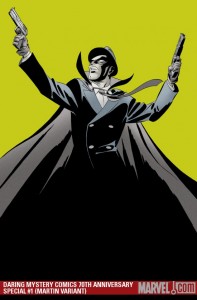 The Variant cover. It costs more because it's harder to find. Our celebration of comic book debut week continues here at davidliss.com. Check out this fun interview I did at Ominicomic.com. I’ve done quite a few of these Q&As for this issue, but this one was probably the most fun because it had the most outside-the-box questions. No one had previously bothered to ask me if I wanted to be friends with the Phantom Reporter. You’ll have to read the interview to find out.
While you are at your local comic book store buying your copy of my Daring Mystery Comics 70th Anniversary Special, you may want to pick up something else, and not be sure what to read. There are tons of great comics bound in trade paperbacks, but if you want to get in on the ground floor of something, I strongly recommend picking up Jeff Lemire’s Sweet Tooth #1. Lemire is best known for his Essex County Trilogy and The Nobody, neither of which I’ve read (but I now plan to!), so I can’t say how this compares. I can say it is an amazing first issue. The story is strange and other worldly, but like all good stories, it is deeply compelling – even heartbreaking. Gus, a sort of hybrid boy/deer, lives in a wilderness sanctuary with his ailing, non-deer father. Something terrible has happened to the world outside, but we don’t know what. There are bad things out there that terrify the father.
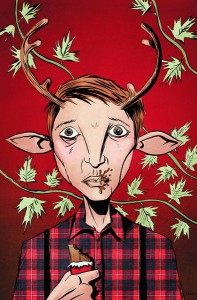 It is sweet. To give away more of the story would be wrong, but suffice to say I can’t remember the last time I read the first issue of a comic to which I was instantly so committed. I am already bouncing in my seat in anticipation for the nest issue. With his powerful script and dreamy art, Lamire draws you into Gus’s world, hooks you with his plot, and gives you just enough information about the larger picture to leave you eager for more. Plus the $1.00 introductory price makes it a no-brainer.
Posted in Uncategorized | Comments Off on
Wednesday, September 2nd, 2009
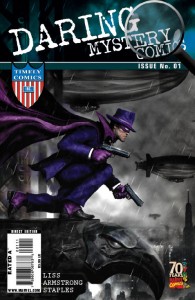 - Amazing cover art by Clint Langley
Friends, I am happy to announce that this is the month, and this the happy morn. Today I debut as a writer of comics. Please be sure to visit your comic book retailer this week to pick up your copy of Daring Mystery Comics 70th Anniversary Special #1, featuring the never-before-told origins of Golden Age hero, The Phantom Reporter. Sinister murder, corporate greed, and a little bit of alchemy thrown in — because that’s how I roll. You can read a brief interview with me about the project here.
Marvel continues its historic anniversary celebration – as the Phantom Reporter leaps from the pages of THE TWELVE into his own solo adventure! By day, cub reporter…by night, relentless scourge of the underworld! But what could drive All-American collegiate champ Dick Jones to become a masked vigilante? Why does this high-society dilettante fight for the underprivileged? And what is the blood-soaked mystery that will take gun-toting terror from the swankiest Park Ave penthouse to the shadowed mean streets on the hunt for justice? Find out as Edgar Award-winning historical thriller novelist David Liss (A Conspiracy of Paper,) makes his comics writing debut and teams with artist Jason Armstrong (Lobster Johnson: The Iron Prometheus) to tell the never-before-revealed origin of the Phantom Reporter! Plus: A classic reprint from DARING MYSTERY COMICS #3!
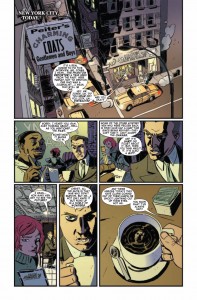 The first page. Dig Jason Armstrong's pitch perfect art. For those of you unfamiliar with how comics work, these books are published on a weekly basis. They will remain in most stores for about two weeks, and then become more difficult to find. As this is my comics debut, and I will be continuing to work in the medium, there is at least the chance that issue will increase in value, making it a good investment in these uncertain times. If you don’t have a favorite place to buy comics, check out ComicShopLocator.com for a store near you.
Posted in Uncategorized | 6 Comments »
|





 On the plus side, however, I did read another good book. It’s not often I read two books I like so close together. Go figure. This time it’s The Magicians by Lev Grossman. I liked Grossman’s previous book, The Codex, which featured a medievalist I’m 40% sure is based on someone I know. Or maybe there are only so many varieties of medievalists. Actually, the more I think about it, the more likely that explanation seems.
On the plus side, however, I did read another good book. It’s not often I read two books I like so close together. Go figure. This time it’s The Magicians by Lev Grossman. I liked Grossman’s previous book, The Codex, which featured a medievalist I’m 40% sure is based on someone I know. Or maybe there are only so many varieties of medievalists. Actually, the more I think about it, the more likely that explanation seems.

 A book you ought to read, however, is Richard Lange’s This Wicked World. In theory, I love crime novels, but I don’t enjoy them anywhere near as often as I like because crime novels are way too often too much crime, not enough novel. In other words, like with most genre fiction, writers often forget what readers dig about fiction in the first place – the chance to read about well-drawn, compelling characters. Lange knows exactly what makes crime fiction work in this story of an ex-con trying to make good in seedy LA. Needless to say, our protagonist gets caught up in some bad business, and ends up doing some rotten things for good reasons, and mixing with a wide array of vivid, engaging, and often disgusting secondary characters. The template is a familiar one in many ways, but that’s true of most novels. The heart of the matter lies in the execution, and This Wicked World is executed brilliantly – reminiscent of Pelecanos at his absolute best. This gets our strongest recommendation.
A book you ought to read, however, is Richard Lange’s This Wicked World. In theory, I love crime novels, but I don’t enjoy them anywhere near as often as I like because crime novels are way too often too much crime, not enough novel. In other words, like with most genre fiction, writers often forget what readers dig about fiction in the first place – the chance to read about well-drawn, compelling characters. Lange knows exactly what makes crime fiction work in this story of an ex-con trying to make good in seedy LA. Needless to say, our protagonist gets caught up in some bad business, and ends up doing some rotten things for good reasons, and mixing with a wide array of vivid, engaging, and often disgusting secondary characters. The template is a familiar one in many ways, but that’s true of most novels. The heart of the matter lies in the execution, and This Wicked World is executed brilliantly – reminiscent of Pelecanos at his absolute best. This gets our strongest recommendation.
 Do you know? I write historical fiction and am not always sure I do.
Do you know? I write historical fiction and am not always sure I do.






